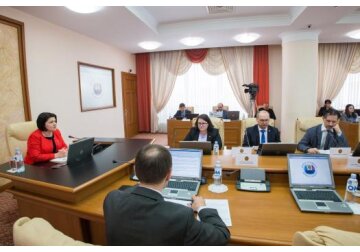
Moldova will introduce new mechanisms for adjusting the cost of a public procurement contract, taking into account subsequent fluctuations in prices for building materials.
This is provided for by the government-approved amendments to the Regulation on Periodic Review of the Cost of Continuous Performance of Public Procurement Contracts concluded for a period of more than 1 year. As noted in the Ministry of Finance, the Law on Public Procurement allows to periodically adjust the cost of the mentioned contracts concluded for a period of more than a year, in the manner established by the Cabinet. According to a provision previously approved by the government, the adjustment of the value of a public procurement contract concluded for a period of more than a year is made taking into account the inflation or deflation coefficient calculated one year before the adjustment and published by the National Bureau of Statistics. However, given the data and signals received from economic operators and contracting authorities signing contracts for public procurement of works, Moldova is currently facing a sharp increase in prices for building materials, which has led to a crisis in this area at the national level. According to the Ministry of Finance, the need to update the cost of contracts for public procurement of works is all the more urgent because the current economic reality is greatly influenced by a significant increase in fuel and gas prices by about 50%, a conflict in the region that stopped the supply of building materials contracted in Ukraine, in Belarus or Russia, a significant increase in the cost of the main materials used in road repairs (bitumen, aggregates, steel, cement, prefabricated elements), due to an uncertain situation. The Ministry of Finance emphasizes that the current economic situation could not have been foreseen and quantified before the events described. Given the significant impact on the construction sector, which could lead to serious delays in implementation schedules or even a complete block, the Ministry of Finance proposed supplementing the Regulation on the periodic review of the cost of continuous execution public procurement contracts concluded for a period of more than a year with new mechanisms for adjusting the value of the contract, which will provide coverage in the price of contracts for public procurement of works fluctuations in prices for building materials. The document will introduce a new concept: "adjustment of the cost of a continuous execution procurement contract concluded for a period of more than one year, based on the actualization of the cost." In addition, the concept of “adjusting the cost of a public procurement contract based on an inflation or deflation index” will be updated, and the methods and conditions for their application will be described. The approved amendments are designed to optimize and streamline the mechanism for adjusting public procurement contracts concluded for a period of more than a year by introducing a new formula that regulates the possibility of adjusting the price of contracts for public procurement of works by updating the corresponding prices for materials, applying an adjustment factor that takes into account any increase or decrease in the cost of materials on which the contract price was based. The regulation will be supplemented by a new chapter that sets out the procedure for considering a request to adjust the cost of continuous execution of public procurement contracts concluded for a period of more than a year based on the cost update. The new chapter details the possible adjustment of prices to cost components, taking into account changes in the price of materials and the price of fuel using a special formula. At the same time, changes in the project allow bidders to choose the formula on the basis of which contracts will be adjusted. This condition must be provided for in the documentation on the conclusion of the contract by the customer. It is also agreed that additional costs arising from the adjustment of the cost of public procurement contracts will be calculated and financed in the process of developing and updating the state budget. The amount of additional allowances will depend on the rise in prices for building materials.// 27.04.2022 — InfoMarket







